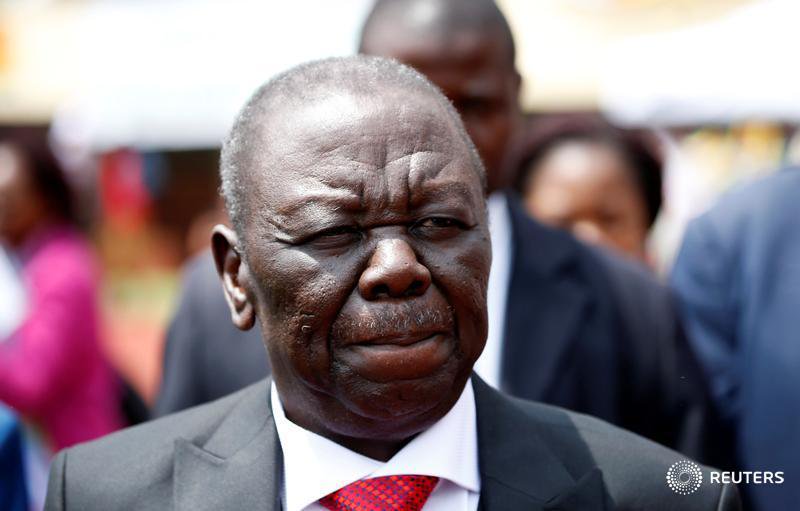Justice Musa Ssekaana of the High Court has thrown out an application by former National Drug Authority (NDA) Head of Drug Assessment Florence Nakachwa Obiocha seeking to block the renewal of Dr Medard Bitekyerezo’s contract as the agency’s Board Chairman.
Dwelling on her affidavit, and a supplementary document filed by Joseph Kamanzi, Nakachwa had asked Court to order Health Minister Dr Jane Ruth Aceng not to appoint Bitekyerezo as member or Chairperson of NDA Board until another suit in which the former Mbarara Municipality MP is accused of abuse of office and funds has been disposed of.
Nakachwa had also asked court to restrain Bitekyerezo (pictured) from holding any position on the Board alleging that “he is not a fit and proper person to hold such an office” because “he has expended public funds of the authority to his benefit and has also rendered himself dishonest and deceitful.” She added that the NDA boss’ conduct had resulted in the agency losing money in legal cost.
She also sought an order binning a November 2019 letter communicating NDA’s decision not to renew her contract which ended at the close of last month.
ATTORNEY GENERAL (AG), BITEKYEREZO DEFEND THEMSELVES
The Attorney General’s office, which Nakachwa had accused of failing “to advise the Appointing Authority” regarding the renewal” of Bitekyerezo’s contract, described the former NDA staffer’s application as “misconceived, frivolous, vexatious, an abuse of court process” and not worthy “of the orders sought.”
Represented by Clare Kukunda, a State Attorney in the office of the government’s chief legal advisor, the AG argued that Nakachwa’s suit sought to curtail Minister Aceng’s powers to appoint the NDA Board yet such authority was “prescribed by law.” Kukunda further argued that issuing a temporary injunction halting Bitekyerezo’s reappointment would be “speculative since the applicant seeks to halt a future possible occurrence and not a current one.”
The attorney further punched holes in the application, faulting Nakachwa for failing to justify her claim that Bitekyerezo was unfit to hold the NDA top office, as well as her argument that the reappointment would cause her irreparable injury.
On his part, Bitekyerezo argued that Nakachwa should not heap blame on him for decisions, including those regarding expenditure of funds, collectively taken by the Board he chaired in his first tenure. On the issue of NDA’s numerous court cases, the medical doctor said employees such as Nakachwa were to blame for failing to “follow proper grievance procedures as set out in the Human Resource Manual” of the agency.
Popularly referred to as Biteks, the Authority boss added that the suit had been “overtaken by events” since he had already been reappointed, further arguing that Nakachwa had failed to show what danger he posed to her life or work.
These affidavits were supplemented by written submissions filed by the lawyers of the three parties. Bitekyerezo was represented by Lelia Katusiime and Ariyo Galindo, Kituuma Magala and Company Advocates submitted on behalf of Nakachwa, while Johnson Natuhwera was the AG’s counsel. The trio buttressed the arguments made by their clients, adding legal flavor – more law jargon, more arguments and case referencing.
In the end, Ssekaana ruled: “This application fails and is dismissed with costs.” The judge agreed with Bitekyerezo that the suit had been overtaken by events. Nakachwa filed her application just over a fortnight before the expiry of her contract. A week after the filing of the suit, Aceng reappointed Biteks.
“Be that as it may, even if the court had proceeded to determine the application on its merits, the application could not satisfy the guiding principles enunciated in this case,” added the judge in his ruling dated March 18.
“The suit does not raise any serious triable issues except for the applicant’s concern of having her contract renewed since it was about to expire.”
The application was also thrown out on procedural grounds, thus: “In the present case, the applicant claims to bring an application for temporary injunction in a public interest and yet the same was not brought by way of judicial review but rather by way of ordinary action or suit. The nature of the dispute ought to have been brought in the known public law procedures of judicial review or enforcement of rights.”





